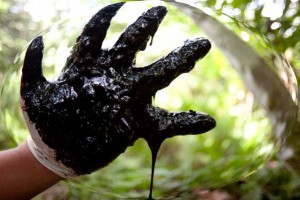 Once again, Chevron has released its “Corporate Responsibility Report” with a straight face. (Here’s our post about last year’s report.) In this post, Amazon Watch’s Robert Collier exposes the irresponsible corporate abuses Chevron conveniently leaves out.
Once again, Chevron has released its “Corporate Responsibility Report” with a straight face. (Here’s our post about last year’s report.) In this post, Amazon Watch’s Robert Collier exposes the irresponsible corporate abuses Chevron conveniently leaves out.
Apparently believing that no outright whopper can’t be repeated again and again, Chevron has issued a report bragging about the company’s “commitment to respecting global human rights.” The 2011 Corporate Responsibility Report, issued May 10th, is a glossy, 50-page masterpiece of corporate greenwashing. Here are some of its claims:
- In Nigeria, Chevron “has delivered more than 200 projects in 425 communities, villages and chiefdoms benefiting some 850,000 people. Chevron launched the Niger Delta Partnership Initiative and announced a five-year, $50 million endowment, including a partnership with USAID, to build capacity and promote long-term economic sustainability.”
- In Angola, Chevron has “committed $4 million over four years to support the Angola Sickle Cell Initiative, the country’s first comprehensive sickle cell treatment program.”
- In Kazakhstan, “Chevron signed a partnership agreement with Nazarbayev University in the country’s capital city, Astana, to provide funds to the Center for Energy Research for studies in energy, the environment and sustainable development, and to provide the Social Development Fund to support young researchers.”
What the report doesn’t tell you is the underside of these nice projects. For example:
- Nigeria – Chevron has a long track record of pollution and collusion with government human-rights abuses. Chevron is accused of involvement in the shootings of Nigerian villagers who occupied an offshore barge in 1998 to protest the company’s hiring and environmental policies. In January 2012, an explosion and fire at an offshore natural gas well killed two people. As of mid-May, the fire is still burning on the ocean surface as the gas escapes uncontrollably.
- Angola – Oil leaks and spills from Chevron’s facilities continue unabated after many years. Fishing communities along the coast continue to complain that fish stocks have decreased significantly because of the spills and seismic activities, and the compensation process is dysfunctional.
- Kazakhstan – Residents near Chevron’s Karachaganak Field have demanded for compensation and relocation to a safe and environmentally-clean location of its choosing because of years of pollution, causing widespread chronic illnesses.
Not to mention, of course, Chevron’s abominable track record in Ecuador, which has made the company a global pariah. Lots more background information on the company’s global record is available at our True Cost of Chevron report.
Now, we don’t doubt that amid its global depredations, Chevron probably has done a few good things, much like dictatorial governments often have a carefully-buffed kind side. Nor do we assume that everyone working for Chevron has poor intentions. Chevron’s more than 600,000 employees around the world surely include many decent, idealistic people. Given the company’s immense financial, technical and human resources, the company has the capacity to do a lot of good.
Which is why it’s such a shame that Chevron’s top management has instead chosen the path of pollution, abuse, bluster and shameless propaganda.
This post originally appeared on Amazon Watch’s blog.